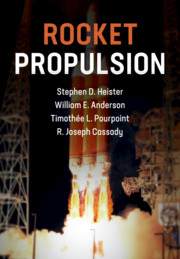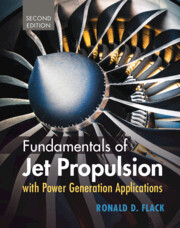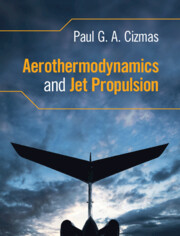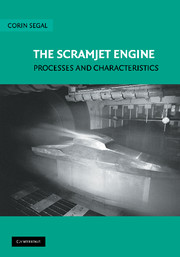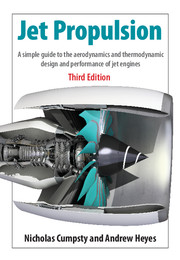Rocket Propulsion
Part of Cambridge Aerospace Series
- Authors:
- Stephen D. Heister, Purdue University, Indiana
- William E. Anderson, Purdue University, Indiana
- Timothée L. Pourpoint, Purdue University, Indiana
- R. Joseph Cassady, Aerojet Rocketdyne
- Date Published: June 2019
- availability: Temporarily unavailable - available from TBC
- format: Hardback
- isbn: 9781108422277
Hardback
Other available formats:
eBook
Looking for an inspection copy?
This title is not currently available for inspection. However, if you are interested in the title for your course we can consider offering an inspection copy. To register your interest please contact [email protected] providing details of the course you are teaching.
-
A modern pedagogical treatment of the latest industry trends in rocket propulsion, developed from the authors' extensive experience in both industry and academia. Students are guided along a step-by-step journey through modern rocket propulsion, beginning with the historical context and an introduction to top-level performance measures, and progressing on to in-depth discussions of the chemical aspects of fluid flow combustion thermochemistry and chemical equilibrium, solid, liquid, and hybrid rocket propellants, mission requirements, and an overview of electric propulsion. With a wealth of homework problems (and a solutions manual for instructors online), real-life case studies and examples throughout, and an appendix detailing key numerical methods and links to additional online resources, this is a must-have guide for senior and first year graduate students looking to gain a thorough understanding of the topic along with practical tools that can be applied in industry.
Read more- Presents a modern treatment of the latest industry trends
- Pedagogically focused and includes real-world case studies and examples
- Accompanied by a library of links to data tables and further online reference materials
Reviews & endorsements
'This text is destined to be a classic in modern rocket propulsion systems. It is an outstanding comprehensive volume that is very well suited for seniors or early graduate students in aerospace engineering. The technical background and analyses are nicely complemented by historical perspectives and a terrific array of challenging technical problems within each chapter.' Ann Karagozian, University of California, Los Angeles
See more reviews'This text provides a complete description of rocket propulsion with tools and techniques provided to support vehicle conceptual design and detailed component design. Liquid engines and solid rocket motors are given equal attention. This well-written book provides a wonderful explanation of rocket propulsion fundamentals and a great set of homework problems.' Dean Misterek, Blue Origin, LLC
'This book begins with an entertaining historical background of rocketry and covers the basic theories and principles of rocket science as well as complete, up-to-date information on the rocket industry, including electric propulsion. Homework problems, meticulously designed by the authors who have a few decades of academic and industrial experience, are enriching, practical, and insightful for both students and field engineers.' Sam Yoon, Korea University
'The authors deliver a welcome and much needed addition to the limited collection of textbooks on rocket propulsion. Its detailed coverage of combustion and thermochemistry is particularly well done and noteworthy - a topic whose details are too often glossed over in other propulsion texts. Written in a clear and approachable style, and offering numerous homework problems, this text is an excellent choice for a senior undergraduate or graduate course in rocket propulsion.' Darren Hitt, University of Vermont
'Rocket Propulsion is an extremely useful addition to the limited textbook resources available in this area. It is written to a very high standard and covers all of the major technological areas and disciplines relevant to the field. It also includes a large number of worked examples and supplementary 'homework' problems. The book is highly recommended for undergraduate and postgraduate study and also for anyone else working in the field in industry or academia.' Derek Bray, Cranfield University
'In Rocket Propulsion, a timely textbook for graduate students, the experience of authors, educators yet linked to industry, is a treasure not to be missed. I find a special care to guide students to understanding rather than just learning and a unique wealth of homework problems, making this book the perfect resource for my graduate students.' Francesco Nasuti, Sapienza Università di Roma
'… an introduction to rocket engineering carefully structured for both graduate students and researchers to be able to easily access the basic knowledge of rocket systems. The most important feature of this book is the abundance of homework problems in each chapter … This book also contains very useful information on chemical rocket systems such as liquid rocket engines, solid rocket motors, and hybrid rockets, which have attracted much attention in the 2000s. Also it introduces the electric propulsion rocket that is becoming a new space propulsion system for satellites. Particularly Chapter 12 provides a basic introduction to the complexity of combustion instability in conventional chemical propulsion systems and will serve as a primer for researchers working on related topics.' Changjin Lee, Konkuk University, Seoul
'Rocket Propulsion is an expertly organized and presented curriculum textbook and guide for senior and first year graduate students looking to gain a thorough understanding of the topic along with practical tools that can be applied in industry. While very highly recommended for college and university library collections, it should be noted for students, academia, and non-specialist general readers with an interest in the subject that Rocket Propulsion is also available in a digital book format.' Carl Logan, Midwest Book Review
'This text fills a void in the aerospace community for a comprehensive, up-to-date text to educate the next generation of rocket propulsion engineers. Some of these engineers will support NASA and the military's efforts to design and build new large launch vehicle and missile systems, while others will support the ever-growing number of new launch vehicle start-ups formed to develop low-cost launch options to serve the growing small satellite community. These new rocket propulsion engineers will be required to work on a broad range of complex problems for which a solid understanding of rocket propulsion fundamentals will be a key to their success. This book, in contrast to the few other available options, provides a complete treatment of rocket propulsion system fundamentals ranging from basic vehicle sizing to details on propulsion subsystem design. Many real-world examples and well-designed homework problems are provided in each chapter.' Dean Misterek, AIAA Journal
'Rocket Propulsion provides a comprehensive coverage of the core aspect of chemical (solid and liquid) rocket motor design. [It] makes good use of relevant examples and case studies which help to ground much of the theoretical analyses presented … this is a very good senior undergraduate or postgraduate level textbook covering key aspects of rocket propulsion with a focus on thermochemical rocket motor design.' Dr Katharine Smith, University of Manchester
Customer reviews
Not yet reviewed
Be the first to review
Review was not posted due to profanity
×Product details
- Date Published: June 2019
- format: Hardback
- isbn: 9781108422277
- length: 586 pages
- dimensions: 260 x 183 x 30 mm
- weight: 1.36kg
- contains: 317 b/w illus. 45 tables 270 exercises
- availability: Temporarily unavailable - available from TBC
Table of Contents
1. Classification of rocket propulsion systems and historical perspective
2. Mission analysis fundamentals
3. Trajectory analysis and rocket design
4. Ideal rocket nozzle performance
5. Combustion and thermochemistry
6. Heat transfer
7. Solid rocket motors (SRMs)
8. Liquid rocket engines (LREs)
9. Liquid rocket propellants
10. Turbomachinery fundamentals
11. Hybrid rocket engines (HREs)
12. Combustion instability
13. Electric propulsion fundamentals.
Sorry, this resource is locked
Please register or sign in to request access. If you are having problems accessing these resources please email [email protected]
Register Sign in» Proceed
You are now leaving the Cambridge University Press website. Your eBook purchase and download will be completed by our partner www.ebooks.com. Please see the permission section of the www.ebooks.com catalogue page for details of the print & copy limits on our eBooks.
Continue ×Are you sure you want to delete your account?
This cannot be undone.
Thank you for your feedback which will help us improve our service.
If you requested a response, we will make sure to get back to you shortly.
×
